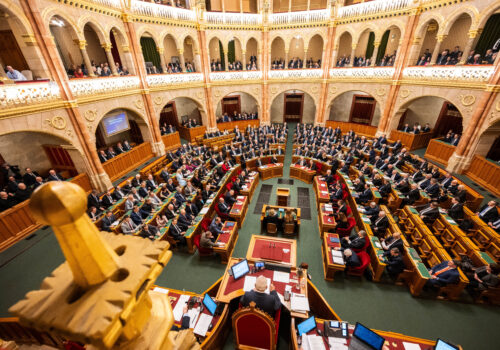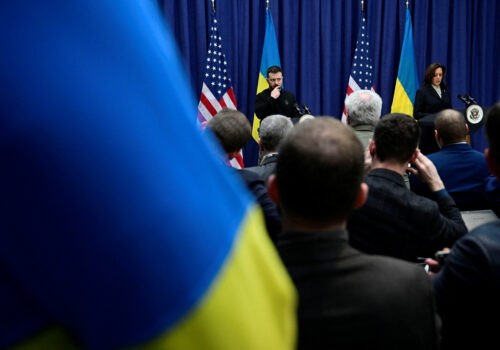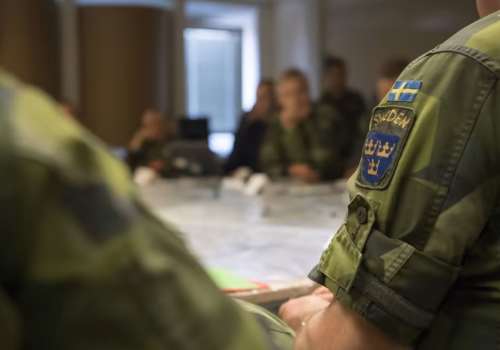What Sweden’s just-ratified accession to NATO reveals about the Alliance
JUST IN
It’s Swe-done. On Monday, Hungary’s parliament ratified Sweden’s accession to NATO, and now only formalities remain before the blue-and-yellow flag can be hoisted at NATO HQ. Hungarian Prime Minister Viktor Orbán needs to sign the ratification, and the document needs to be deposited with the US government. It’s a bureaucratic finish to a process that began more than 650 days ago in response to Russia’s full-scale invasion of Ukraine. What did the process reveal about the Alliance? And what will change with thirty-two allies? Below, Atlantic Council experts share their insights.
TODAY’S EXPERT REACTION COURTESY OF
- Christopher Skaluba: Director of the Transatlantic Security Initiative in the Atlantic Council’s Scowcroft Center for Strategy and Security and former principal director for European and NATO policy at the Pentagon.
- Elisabeth Braw (@elisabethbraw): Senior fellow with the Atlantic Council’s Transatlantic Security Initiative in the Scowcroft Center for Strategy and Security
- Daniel Fried (@AmbDanFried) Weiser family distinguished fellow and former US assistant secretary of state for Europe
Messy and meaningful
- The rigamarole required to get Sweden into NATO is also a strength, explains Chris: “Democratic institutions—like democracy itself—are messy. They require deliberation, debate, and horse-trading, which can be slow and painstaking.” But working through “glitches” ahead of time, he adds, put the final decision on firmer ground.
- At the same time, Elisabeth calls the process “a cautionary tale for all Western governments.” Sweden’s bid “fell victim to geopolitical wrangling and grandstanding that had little to do with Sweden, and with goodwill fraying among Western nations and their partners, other foreign and security initiatives are likely to encounter similar obstacles.”
- Even with the months-long process, don’t lose sight of the larger change that took place in formerly non-aligned Sweden, Dan notes: “NATO membership went from being an exotic option with little support to an urgent priority in just two years, triggered by Russia’s full-scale invasion of Ukraine.”
Subscribe to Fast Thinking email alerts
Sign up to receive rapid insight in your inbox from Atlantic Council experts on global events as they unfold.

Russia’s role
- Sweden joining NATO is a “strategic setback” for Russia, explains Dan: “Russia has blamed NATO enlargement for a host of ills, and many of Putin’s Western apologists blame the threat of NATO enlargement to Ukraine for setting off Russia’s invasion.”
- However, Dan points out that “movement toward NATO enlargement to Ukraine was nonexistent” prior to Putin’s seizure of Ukrainian territory in 2014 and full-scale invasion in 2022. “But the 2022 invasion triggered actual NATO enlargement elsewhere that otherwise would not have taken place.”
- It’s “distressing” that Russian President Vladimir Putin seemed able to use his relations with some NATO heads of state to draw out Sweden’s accession process, says Chris, but the end result is what matters most: “A vengeful and determined Putin could slow but not ultimately undermine NATO’s intrinsic resilience—a fact that should be celebrated every bit as much as Sweden finally taking its formal seat at the NATO table.”
Sweden’s strengths
- Sweden “will be off to a rapid and impressive start as a member of the Alliance,” says Elisabeth. Sweden has already announced that it will allocate a battalion to the brigade NATO is establishing in Latvia, and its highly capable air force and navy will strengthen the Alliance. “As of this week, many within the Alliance are likely to ask what NATO ever did without Sweden.”
- “Sweden’s accession to NATO vindicates the US investment in the Alliance for the past seventy-five years,” Dan tells us. Sweden is expected to spend above 2 percent of its gross domestic product on defense this year, and adding its capability will show NATO skeptics that Europe is pulling its weight, he adds.
- The hard diplomatic work that was done to reach this point must continue, Chris says: “It may seem counterintuitive, but bilateral relations become more rather than less important once inside NATO.”
Further reading
Mon, Feb 26, 2024
It’s Swe-done: What’s next for NATO now that Hungary has approved Sweden’s bid to join
New Atlanticist By
Hungary’s parliament has ratified Sweden’s accession to NATO, the final approval needed. Atlantic Council experts share their insights on the about-to-be thirty-two member Alliance.
Tue, Feb 20, 2024
Dispatch from Munich: The lessons of appeasement for US lawmakers withholding support for Ukraine
Inflection Points By Frederick Kempe
The lesson of Munich, then and now, is that the cost of countering a despot will only grow.
Fri, Dec 22, 2023
Navigating Sweden’s NATO membership: Insights for political and operational adaptation
Issue Brief By Viltaute Zarembaite, Christopher Skaluba, Ann Marie Dailey
Sweden is on the cusp of joining Finland as NATO's newest members, bridging a crucial gap in the region's security architecture and creating new opportunities for closer security cooperation. Once Sweden is in NATO, the Baltic Sea will be a geographically coherent strategic space—or, in more casual parlance, a "NATO lake."
Image: Swedish Prime Minister Ulf Kristersson (l) and Hungarian Prime Minister Viktor Orban shake hands after a joint press conference in Budapest. Shortly before Hungary's expected approval of Sweden's accession to NATO, the two countries have agreed a comprehensive arms deal.


